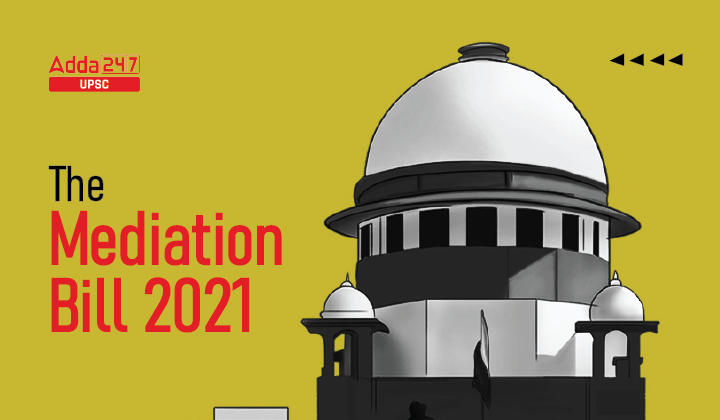Table of Contents
The Mediation Bill, 2021- Relevance for UPSC Exam
General Studies II- Parliament & State Legislatures
What is mean by Mediation?
- Mediation: Mediation is a process wherein the parties meet with a mutually selected impartial and neutral person who assists them in the negotiation of their differences.
- Brings Parties Together: Parties can save and sometimes rebuild their relationship like during a family dispute or commercial dispute.
- Very Convenient: The parties can control the time, location, and duration of the proceedings to large extent. Scheduling is not subject to the convenience of courts
The Mediation Bill, 2021: India’s need
- While there is no standalone legislation for mediation in India, there are several statutes containing mediation provisions,such as the Code of Civil Procedure, 1908,the Arbitration and Conciliation Act, 1996,the Companies Act, 2013, the Commercial Courts Act, 2015, and the Consumer Protection Act, 2019.
- Supreme Court mandate: The Mediation and Conciliation Project Committee of the Supreme Court of India describes mediation as a tried and tested alternative for conflict resolution.
- Being an international signatory: As India is a signatory to the Singapore Convention on Mediation (formally the United Nations Convention on International Settlement Agreements Resulting from Mediation), it is appropriate to enact a law governing domestic and international mediation.
The Mediation Bill, 2021: Key Features
- The Bill aims to promote, encourage, and facilitate mediation, especially institutional mediation, to resolve disputes, commercial and otherwise.
- The Bill further proposes mandatory mediation before litigation and it safeguards the rights of litigants to approach competent adjudicatory forums/courts for urgent relief.
- The mediation process will be confidential and immunity is provided against its disclosure in certain cases.
- The outcome of the mediation process in the form of a Mediation Settlement Agreement (MSA) will be legally enforceable and can be registered with the State district or taluk legal authorities within 90days to ensure authenticated records of the settlement.
- The Bill establishes the Mediation Council of India and also provides for community mediation.
- If the parties agree, they may appoint any person as a mediator. If not, they may apply to a mediation service provider to appoint a person from its panel of mediators.
- The Bill lists disputes that are not fit for mediation (such as those involving criminal prosecution, or affecting the rights of third parties). The central government may amend this list.
- The mediation process must be completed within 180 days, which may be extended by another 180 days by the parties.
The Mediation Bill, 2021: Concerns
- According to the Bill, pre-litigation mediation is mandatory for both parties before filing any suit or proceeding in a court,whether or not there is a mediation agreement between them.
- Parties who fail to attend pre-litigation mediation without a reasonable reason may incur a cost. However,as per Article 21 of the Constitution,access to justice is constitutional right which cannot be fettered or restricted. Mediation should just be voluntary and making it otherwise would amount to denial of justice.
- According to Clause26 of the Bill, court annexed mediation, including pre-litigation mediation, will be conducted in accordance with the directions or rules framed by the Supreme Court or High Courts. However, the Committee objected to this. It stated that Clause26 went against the spirit of the Constitution.In countries that follow the Common Law system, it is a healthy tradition that inthe absence of statutes, apex court judgments and decisions carry the same weight. The moment a law is passed however, it becomes the guiding force rather than the instructions or judgments given by the courts. Therefore, Clause 26 is unconstitutional.
- Bill considers international mediation to be domestic when it is conducted in India with the settlement being recognised as a judgment or decree ofa court. The Singapore Convention does not apply to settlements that already have the status of judgments or decrees. As a result, conducting cross border mediation in India will exclude the tremendous benefits of worldwide enforceability.
Conclusion
- In order to enable a faster resolution of disputes,the Bill should be implemented after discussion with stakeholders and resolve the issues in an amicable manner. It’s a good opportunity for India to become an international mediation hub for easy business transactions.



 TSPSC Group 1 Question Paper 2024, Downl...
TSPSC Group 1 Question Paper 2024, Downl...
 TSPSC Group 1 Answer key 2024 Out, Downl...
TSPSC Group 1 Answer key 2024 Out, Downl...
 Cabinet Ministers of India 2024, New Cab...
Cabinet Ministers of India 2024, New Cab...







